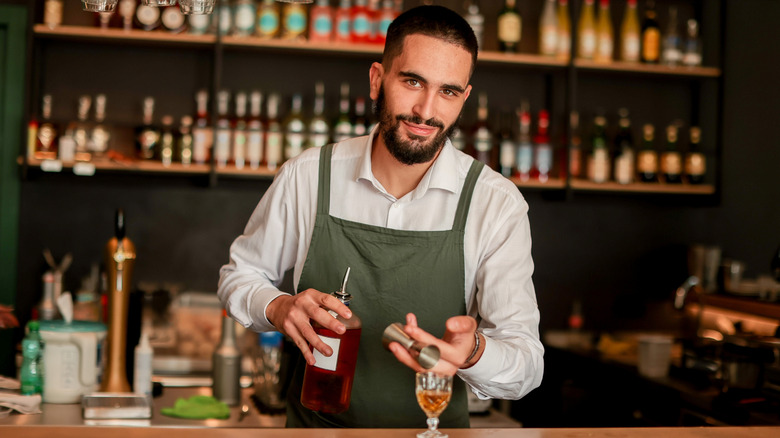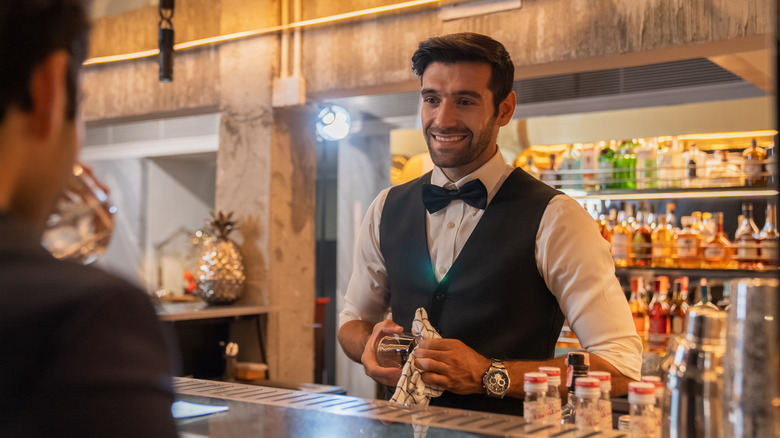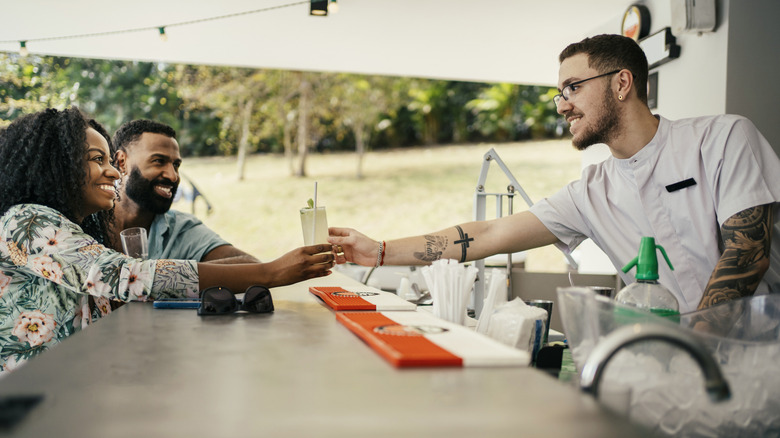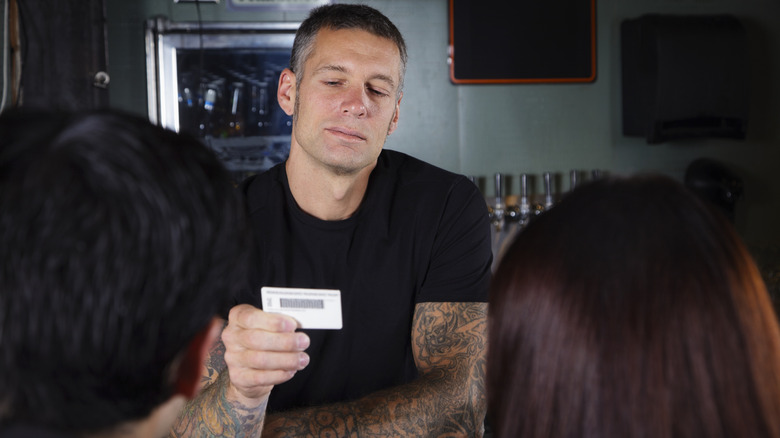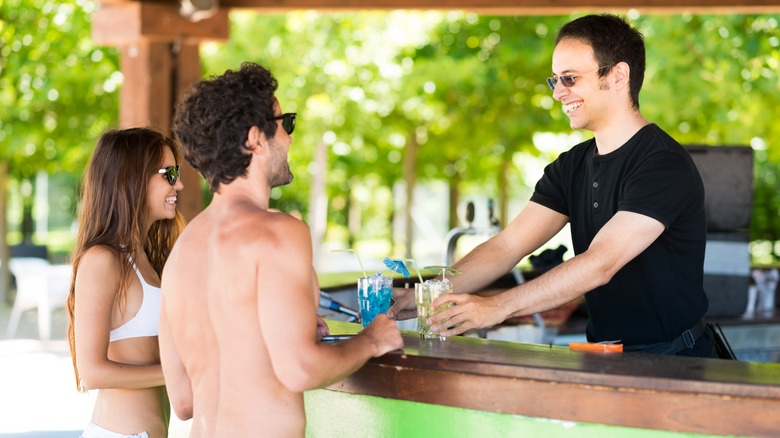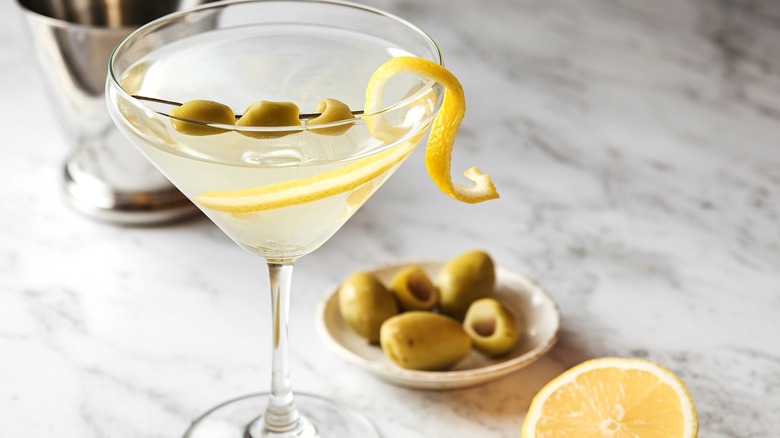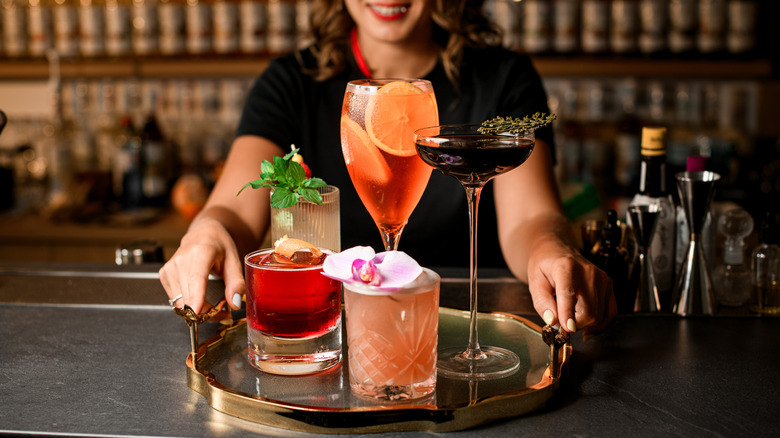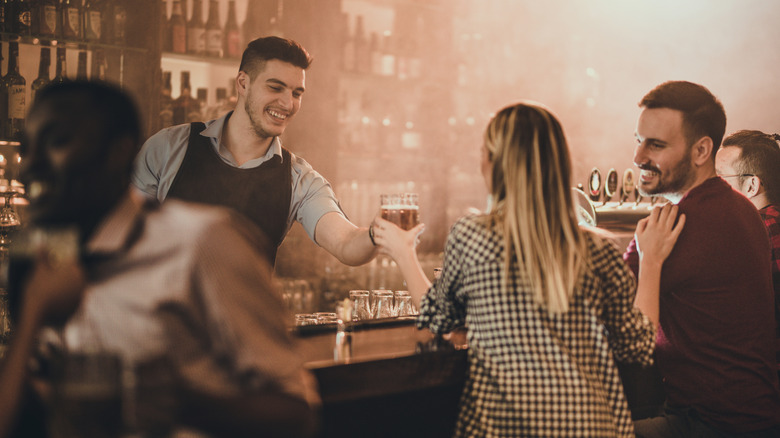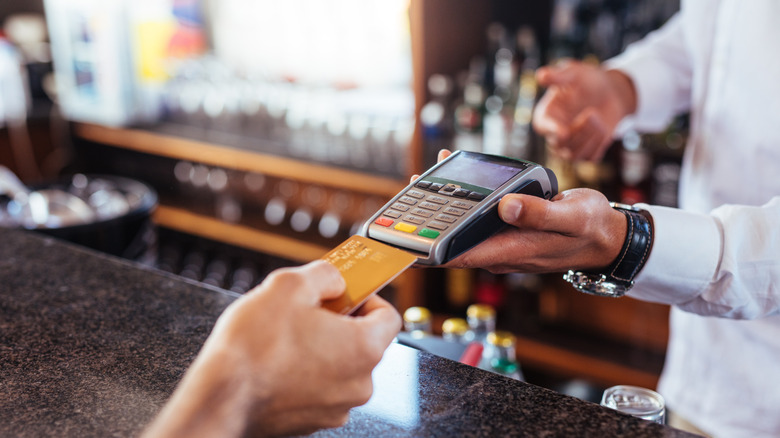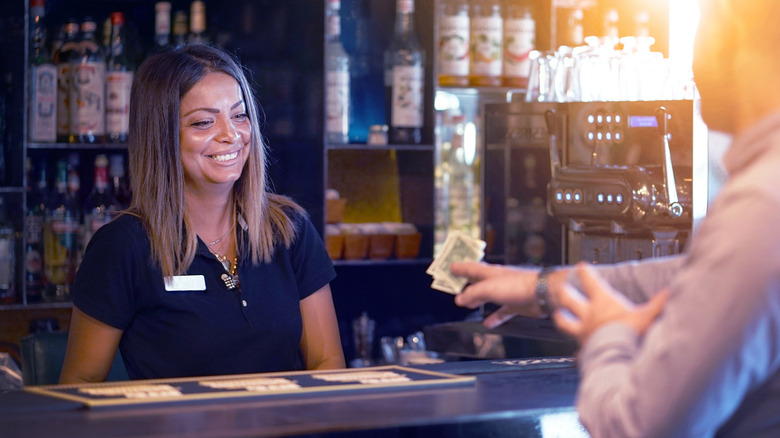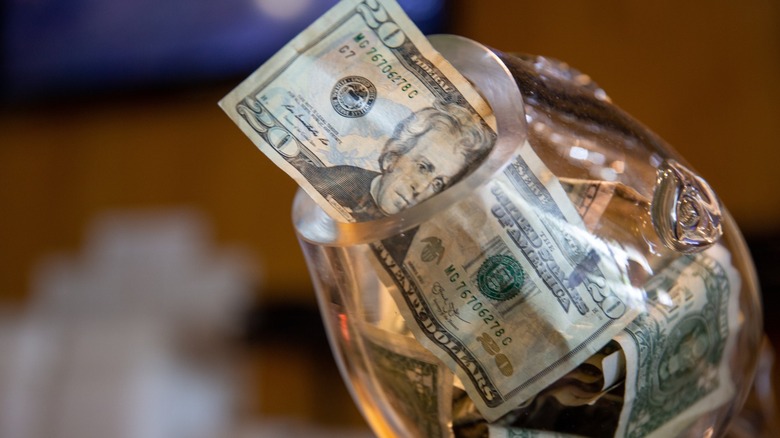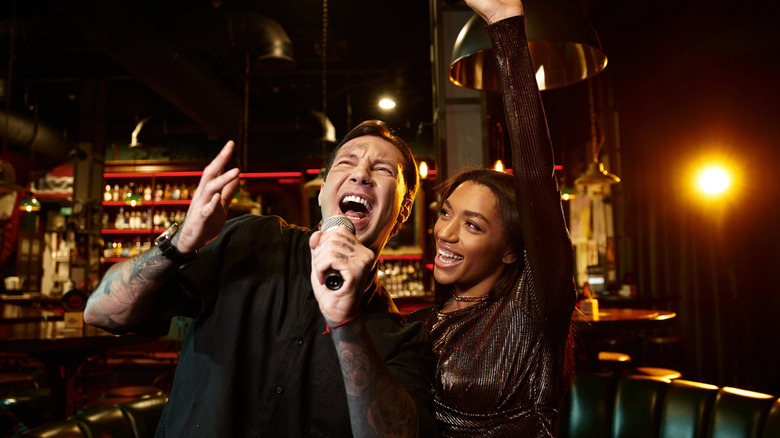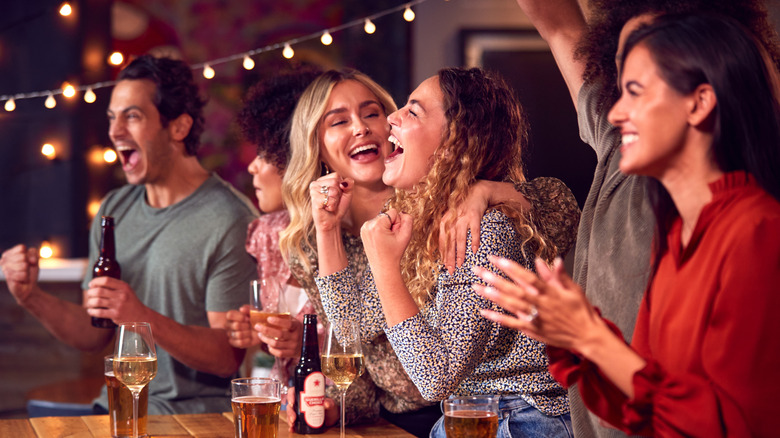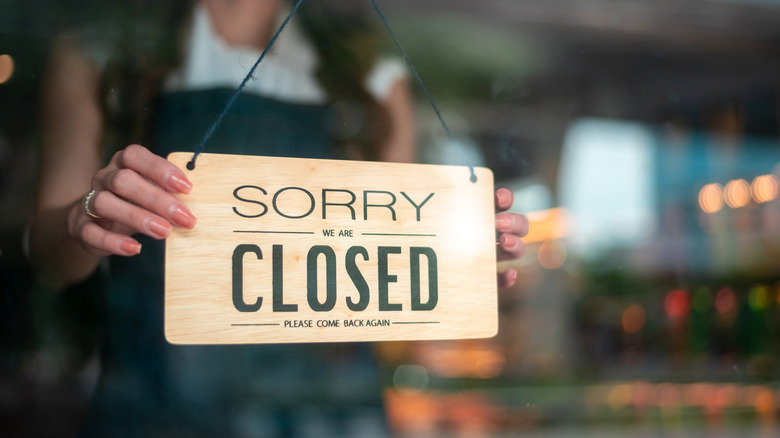How To Get Great Service At Any Bar, According To Industry Experts
We've all been there. You're standing at a crowded bar, desperately trying to get noticed by the bartender. Meanwhile, someone who arrived after you is already sipping a perfectly crafted cocktail. Why them and not you? It's not about luck. It's about understanding the unwritten rules of bar etiquette.
A subtle psychology separates those who get great service and those who struggle to order successfully. Luckily, we're here to reveal these secrets. To understand how to get great service at any bar, we asked two industry veterans, Tonya Fleetwood and Joseph Bennett. Fleetwood is a bartender and bar manager at Planet Rose, a zebra-print, karaoke hot spot in NYC's East Village. She also works as a hospitality publicist and is well-acquainted with many venues nationwide. Bennett is the owner of Bennett Bitters, selling premium cocktail bitters handcrafted with organic ingredients. Before starting his bitters company, he worked behind the bar and managed several establishments, from rock and roll bars to fine dining.
Whether you're at a neighborhood pub or a swanky speakeasy, receiving excellent service is essential. It's not just about getting drinks promptly — it's about enjoying a welcoming atmosphere where your needs are met with ease. So if you want to transform from perpetual bar wallflower to VIP, keep reading. We'll dive into the insider techniques that will enhance your bar experience forever.
Make eye contact
One of the best ways to signal attention in a crowded bar is eye contact. It communicates to the bartender that you're present and ready to order, without being pushy. Tonya Fleetwood shares that "Body language and demeanor are huge factors in getting noticed, both positively and negatively." Waving money or reaching over the bar may attract attention, but it won't encourage positive vibes. Relaxed eye contact is all you need to get the ball rolling.
Simply stand in one spot and look at the bartender. When they're ready to take orders, they'll lift their gaze and assess the bar. Locking eyes is a sign of acknowledgement, and while it's all that's required, a smile or nod couldn't hurt. As Joseph Bennett explains, "If a bartender makes eye contact with you, they know you're there and they're getting to you." However, don't get discouraged if they take another order beforehand. They're likely making their way down the line, but have clocked your position in the queue.
Be ready to order – but not pushy
Eye contact is a great nonverbal cue, but it's just the first step. Show the bartender you're ready to order. "Often, if I see a guest with a wallet in hand and clearly waiting for service (not talking to their friends), it tells me that they're ready to put in their order," explains Joseph Bennett. However, he warns patrons not to be pushy, and he notes that shouting, talking over others, or snapping fingers is never appreciated. While you might still get served, you won't earn any good karma — or barma. And if you have special requests later, bartenders will be less motivated to help.
When the bartender approaches, know your beverage of choice. If unsure, don't ask bartenders for a surprise drink at the bar without context. Instead, ask targeted questions with potential preferences in mind. Interested in signature cocktails but not a fan of bitter flavors? Communicate this clearly. The more specific information you provide, the more your bartender can guide you.
Being prepared also extends to payment. Tonya Fleetwood advises, "Be prepared with your cash or credit card rather than waiting to hear the total and then dig in your purse/bag for your wallet." This efficiency is greatly appreciated by bar staff and speeds up service for everyone. And if you plan to order multiple rounds, consider opening a tab (but more on that later).
Bring your ID
Bartenders must ID anyone who appears younger than the legal drinking age — many establishments use the "under 30" rule of thumb. Even if you're well over this age, it doesn't hurt to carry identification. Any government-issued ID that includes a photo, physical description, age, and name will suffice: state ID cards, driver's licenses, military IDs, or passports. Make sure it's not expired and you have the actual document, not a copy or photo.
"It's my job to ask for your ID. It's the law," explains Tonya Fleetwood. "If you don't have it, then make a mental note to remember next time, and respectfully exit the bar." She urges guests not to make things difficult: "Please don't tell me that you were at the bar yesterday or that you know the bar's owner... Even if you think it's obvious that you're 21+, just abide." Remember, being carded isn't personal — bartenders simply can't risk their jobs or the establishment's liquor license on an age-guessing game. And without proper ID, service is the least of your concerns (you might not get served at all).
Treat bar staff and other patrons well
Your energy and attitude create ripple effects throughout the bar. Bartenders are keenly observant, quickly assessing your demeanor even in brief interactions. "I will always notice kindness — both while waiting for a drink as well as the way they treat other customers," Tonya Fleetwood shares.
Why does this matter? Beyond common courtesy, your behavior shapes the entire atmosphere. Negativity spreads and contaminates everyone's experience, while respect promotes a happy environment. Plus, bar staff naturally respond better to courteous patrons — not because they are playing favorites, but because positive interactions inspire better service. As Fleetwood puts it, "I will have a more positive opinion of you if you are respectful (to me, to the staff, to the bar, and to the other customers)."
Order concisely and efficiently
Bartenders aren't mind readers, so order concisely and efficiently. "Know your drink order and know how to order it specifically," Joseph Bennett explains, "If you want a martini, it's good to include whether you want it vodka or gin, shaken or stirred, up or on the rocks, dry or wet, and twist or olives."
Vague requests won't just confuse your bartender — they may leave you nursing a drink you don't like. Specify preparation style, garnishes, and, of course, alcohol preferences. Bartenders will likely ask if you want well liquor or a particular brand. When "call" drinks are mentioned on bar menus, you can choose your preferred alcohol brand.
New to the spirit world? Feel free to defer to the experts behind the bar as you develop your palate. But as you sip cocktails, pay attention to what you enjoy. Don't be afraid to do some light research, either, like learning the difference between cristalino and blanco tequila or añejo versus extra añejo.
Know basic bartending terminology
A little bar lingo goes a long way. Mastering basic terminology not only helps you build rapport with bartenders and order successfully — it makes you feel more at home in your local watering hole.
Joseph Bennett recommends everyone know terms like "on the rocks, up, neat." Need a quick crash course? Rocks means over ice, up means served chilled without ice, and neat means room temperature without ice. "It's also good to generally know the common ingredients behind the bar and what they're used for, like olives, soda, tonic, lemon juice," Bennet adds. And if you hear the term "86'ed," the bar's simply run out of that item. "I appreciate when customers know the difference between a pint glass and a highball glass," Tonya Fleetwood adds, "especially if they're ordering a double of any specific cocktail." While classic drinks come in designated glassware, familiarizing yourself with different types of cocktail glasses will streamline your ordering experience.
Although certain terminology impresses, other words and phrases should be avoided when ordering drinks. For example, it's pointless to request your drink be made "strong." Bartenders use specific ingredient ratios to balance flavors (not to mention extra booze costs money). If you want a strong cocktail, don't ask for a sneaky heavy pour. Just order a double and pay accordingly. Your bartender — and your dignity — will thank you.
Be patient and respect the order of service
Want good service at the bar? Don't rush the bartender, especially in bustling venues where bartenders are juggling orders like circus performers. A subtle nod and slightly raised hand say, "I'm here, no rush," which counterintuitively, often leads to faster, better service.
Bartenders want to serve you quickly, but there's a method to their mixology madness. Joseph Bennett shares that if a bartender sees you but hasn't taken your order, they're probably not ignoring you. "When working at a high volume bar or on a busy night, bartenders keep a queue in their heads when guests arrived to the bar and are ready to order. They try to take orders for multiple guests, in the order that the guests arrived, so that they can go and make all the drinks at once." Bartenders cycle through phases of taking orders and making drinks, and may also have table orders. Trust the process and rest assured your order will be taken at the appropriate time. "If you try to get an order in when they're not ready to collect it, there's a good bet you'll get pushed to the end of the queue," Bennett adds.
Finally, don't be a beverage bottleneck. Tonya Fleetwood notes that for those not sitting at the bar, "Once you've received your drink and paid (and if you're not sitting in a seat at the bar), then move away from the bar to allow the people behind you to place their drink order." This signals respect to your bartender and fellow thirsty patrons and keeps those beverages flowing smoothly.
Start a tab when ordering multiple rounds
Time is golden behind the bar, and every second counts. Starting a tab makes it easier for bar staff to serve guests efficiently. It also allows customers to enjoy the moment fully. Rather than worry about paying for each drink, they can consolidate their purchase into a single bill.
Customers have long been able to open a tab with a debit or credit card and add drinks as they go. However, some modern point-of-sale (POS) systems allow clients to access their tab through an app or QR code. This newfound power enables guests to open, manage, and close tabs virtually — and even use wireless payments, eliminating the need for physical cards altogether.
Obviously, this only makes sense when paying with an online banking system. "If a customer is paying with cash, then paying as they go is completely fine and acceptable," says Tonya Fleetwood. "If paying with a credit card, then yes, I prefer guests to open a tab and pay once when they're ready to leave."
Tip your bartender appropriately
Service industry workers rely heavily on tips — base wages often don't cut it. Tipping your bartender not only helps them make a living, but it also shows you respect their craft. So what's an appropriate amount? "It depends on what you're ordering and how hard the drink is to make," says Joseph Bennett, "As a bartender, I'm not expecting the same tip from a round of vodka sodas versus a round of complicated bespoke drinks." His bottom line? Never dip below 15% (unless you want to seriously insult the bartender). Meanwhile, 25% is considered "a good high end."
Tonya Fleetwood agrees that tips should reflect the intricacy of the beverage. After all, opening a beer bottle is far easier than muddling a Mojito. "$2 per drink is generally the bare minimum," she shares. She wisely adds that tipping generously is never a bad idea, "Bartenders will always remember those that tip well and those that don't." However, don't go thinking a hefty tip buys you a free pass for bad behavior. Bartenders remember those who act disrespectfully — and no amount of money can magically erase that.
Tip with cash
Some bars prefer card payments, while others feel cash is king. But across the board, bartenders agree: Cold, hard cash is the gold standard for tipping. "If you tip with cash, there's no need to go back through and ring in the tip afterward," Joseph Bennett explains. It's a clean, immediate transaction. Plus, as Tonya Fleetwood points out, "Some bars also tip out their staff with the collected cash tip at the end of the night, but put credit card tips on their paychecks." This forces staff to wait weeks to see the fruits of their labor.
Ever worked a tough day in the service industry? Nothing softens the blow like counting cash tips. So why not spread that joy? Plus, cash tips don't just benefit staff — they can improve service too. Bartenders have remarkable memories for faces, especially when cash is involved. If you want to stand out, show appreciation through tangible means. Your reputation (and service) may get an instant upgrade.
Have fun, but stay in line
Let's get things straight — bar staff want you to have fun. They just don't wanna moonlight as your parents, babysitters, or therapist (unless your gossip is juicier than their cocktails). Making their job harder means less time for service, so respect both the house rules and the unspoken bar etiquette. Bartenders particularly hate it when you do certain things, like get rowdy, start fights, or perform the infamous "drink-and-dash." And, no, those four martinis haven't suddenly bestowed upon you untapped bartending talents, so don't micromanage your mixologists.
A little tipsy fun is perfectly acceptable, as long as you're safe, respectful, and responsible. Unfortunately, we've all witnessed the spectacle: A bar-goer crosses the line from "life of the party" to "liability." Although she hopes it's never you, Tonya Fleetwood gently reminds, "Know your limits. If a bartender cuts you off, please just accept it."
If you're fuzzy on the boundaries, Joseph Bennett's got you covered: "Bothering fellow guests or the bartender with loudness, physical contact, or touching their things is not cool and can get you kicked out, sometimes even banned from the bar." A good rule of thumb? If your behavior puts yourself or others at risk — physically, emotionally, or safety-wise — it's a no-go.
Understand the type of bar you're visiting
The vibe of a bar changes everything. Dive bars have unpretentious charm, cocktail bars pride themselves on craftsmanship, and nightclubs thrive on efficiency. Each spot has its own unwritten rules and expectations, and getting a lay of the land will seriously enhance your experience and service.
"Be aware of the type of bar you came into," suggests Joseph Bennett. "If you're at a busy dive bar, a club, or a fast-paced mixology bar with bespoke drinks, the bartender probably won't have a lot of time to chat." However, if you're after a mini mixology lesson, "Going to a mixology bar or a high-end whiskey bar with limited seats will give you much more opportunity to learn about drinks and spirits."
Consider the energy level of your destination. If you crave high energy and a little chaos, head to that packed sports bar for the big game. If you prefer chill vibes and relaxation, choose a quieter wine bar. Also, set yourself up for successful service by ordering the right drink. Don't be that person ordering an elaborate ten-ingredient cocktail at a slammed college bar or requesting a Bud Light at a high-end establishment. Similarly, there are drinks you should order and skip at a speakeasy. Manhattans and specialty cocktails are a solid choice, while basic beer seems like a waste of mixology talent.
Respect closing times
Our last tip for getting great service in any bar? Respect closing times by knowing when to leave. You don't want to overstay your welcome, potentially jeopardizing future visits and the quality of service you experience. Just as you wouldn't love receiving a long business call just before clocking out, bartenders don't enjoy making a mojito two minutes before closing.
Arriving just before closing may be convenient for you, but it can appear inconsiderate. Luckily, Joseph Bennett offers a nice compromise: "It's not poor etiquette if you ask permission from the bartender when you arrive and respect their response." They might still be willing to serve you, but it's bad form to expect them to make anything that will require them to clean the bar again.
When you respect bar staff's time and schedule, they'll naturally deliver better service. So when the lights come on and the music ends, take a hint. Finish that whiskey and beer and make your way to the exit.
